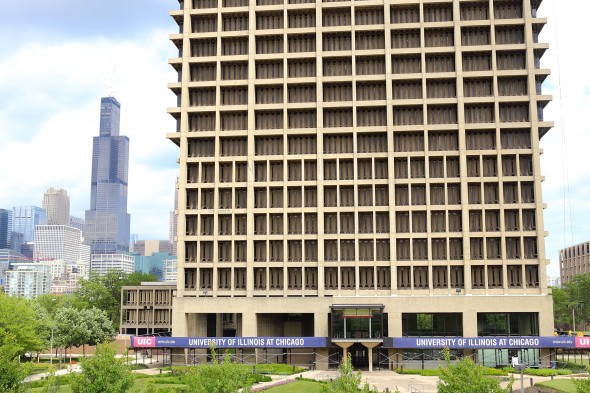UIC Senate votes ‘no confidence’ in chancellor’s leadership
In a special meeting of the UIC Senate Thursday, members voted 44-9 in favor of a resolution of no confidence in the leadership of Chancellor Paula Allen-Meares.
“There was concern about what the resolution would signify, but the faculty wanted to send a clear message to administration,” Catherine Vincent, chair of the senate executive committee, said after the vote.
The meeting was called in response to recent changes in top campus administration that faculty said were made without their input.
“Shared governance requires both appropriate consultation before important decisions are made and prompt and informative communication regarding those decisions,” the resolution read.
“These actions have caused serious damage to the campus community’s trust in the administration’s commitment to shared governance.”
The resolution said “oversight by the president and the Board of Trustees was not exercised in a manner which reflects respect for shared governance” and demanded that campus and university administration “reiterate publicly and demonstrate their commitment to shared governance as an important factor in the current searches for the top leadership of the campus and university.”
Earlier this month, separate official emails announced that Lon Kaufman, vice chancellor for academic affairs and provost, and Bette Bottoms, vice provost for undergraduate affairs, had stepped down from their positions.
“Although we appreciate that the reasons for personnel decisions typically cannot be publicly announced, the lack of information led to widespread confusion and demoralization on campus, and led to widespread rumors,” Vincent said at the meeting.
Faculty are concerned about “the effect of these abrupt changes in the top leadership of the campus coming at an extremely unfortunate time,” because searches are under way for both chancellor and university president and Allen-Meare’s contract ends Jan. 15, said Vincent, associate professor of women, children and family health science in the College of Nursing.
The senate meeting opened with public comments before going into executive session for discussion.
Allen-Meares told the group that decisions regarding Kaufman and Bottoms were made in consultation with President Robert Easter and university trustees. She said the delay in notifying the campus was “due to the confidential nature of personnel discussions.”
She praised the two administrators appointed to fill the positions, interim provost Eric Gislason and interim vice provost Emanuel Pollack, and said, “there are no other changes in the administrative leadership team.”
Gislason, professor emeritus of chemistry, asked senators to “keep the best interests of UIC in mind,” adding, “A vote of no confidence against the chancellor will make it considerably more difficult to recruit the kind of leader we need.”
Barbara Henley, vice chancellor for student affairs and a UIC alumna, also spoke against the resolution.
“Under Chancellor Paula Allen-Meares, UIC has remained on an upward trajectory. Our profile has risen,” Henley said. “I urge you not to devalue my degree and that of 27,000 other students by taking a vote of no confidence in our chancellor.”
Several faculty expressed confusion over the fact that the announcement that Kaufman was stepping down as provost was followed the next day by an announcement that he had been appointed university assistant vice president for corporate and community relations in health affairs.
“I think the timing has been very suspicious,” said Nancy Cirillo, associate professor emerita of English.
History professor Leon Fink said the principle of shared governance was one of the most important issues in the collective bargaining contract between the university and UIC United Faculty.
“What lessons were learned, if not about shared governance and faculty at the table in all decisions?” he said.
Jennifer Brier, associate professor of gender and women’s studies, and Mrinalini Rao, professor of physiology and biophysics who chairs the chancellor search committee, said the large turnout at the meeting should be the beginning of greater faculty involvement.
“I’m sorry that we had to reach this kind of situation for all the faculty to get together,” Rao said. “I hope this will be a stepping stone, moving forward, to really take ownership of this campus. We need to present a united front for our students and ourselves.”
Special UIC Senate Meeting
August 28, 2014 Resolution
WHEREAS, shared governance, involving students, faculty and staff is central to the ability of UIC to achieve its teaching, research and service missions;
WHEREAS, shared governance requires both appropriate consultation before important decisions are made and prompt and informative communication regarding those decisions;
WHEREAS, both the Provost and the Vice-Provost for Undergraduate Affairs have been replaced with interim appointees in the last few weeks, and these changes come at a difficult time with searches underway for both a new Chancellor and a new President;
WHEREAS, there was no consultation with students, faculty or staff or any of their elected representatives in the time leading up to these decisions;
WHEREAS, neither decision was communicated to students, faculty or staff in a timely way, with widespread rumors and media reports preceding the official announcement;
WHEREAS, these actions have caused serious damage to the campus community’s trust in the administration’s commitment to shared governance;
WHEREAS, oversight by the President and the Board of Trustees was not exercised in a manner which reflects respect for shared governance;
THEREFORE, The UIC Senate has no confidence in the Chancellor’s leadership of the campus.
Further, we demand that the Campus and University Administration:
• Consult with the campus community and their elected representatives for important decisions.
• Communicate such decisions to the entire campus in a timely and informative manner, and
• Reiterate publicly and demonstrate their commitment to shared governance as an important factor in the current searches for the top leadership of the Campus and University

